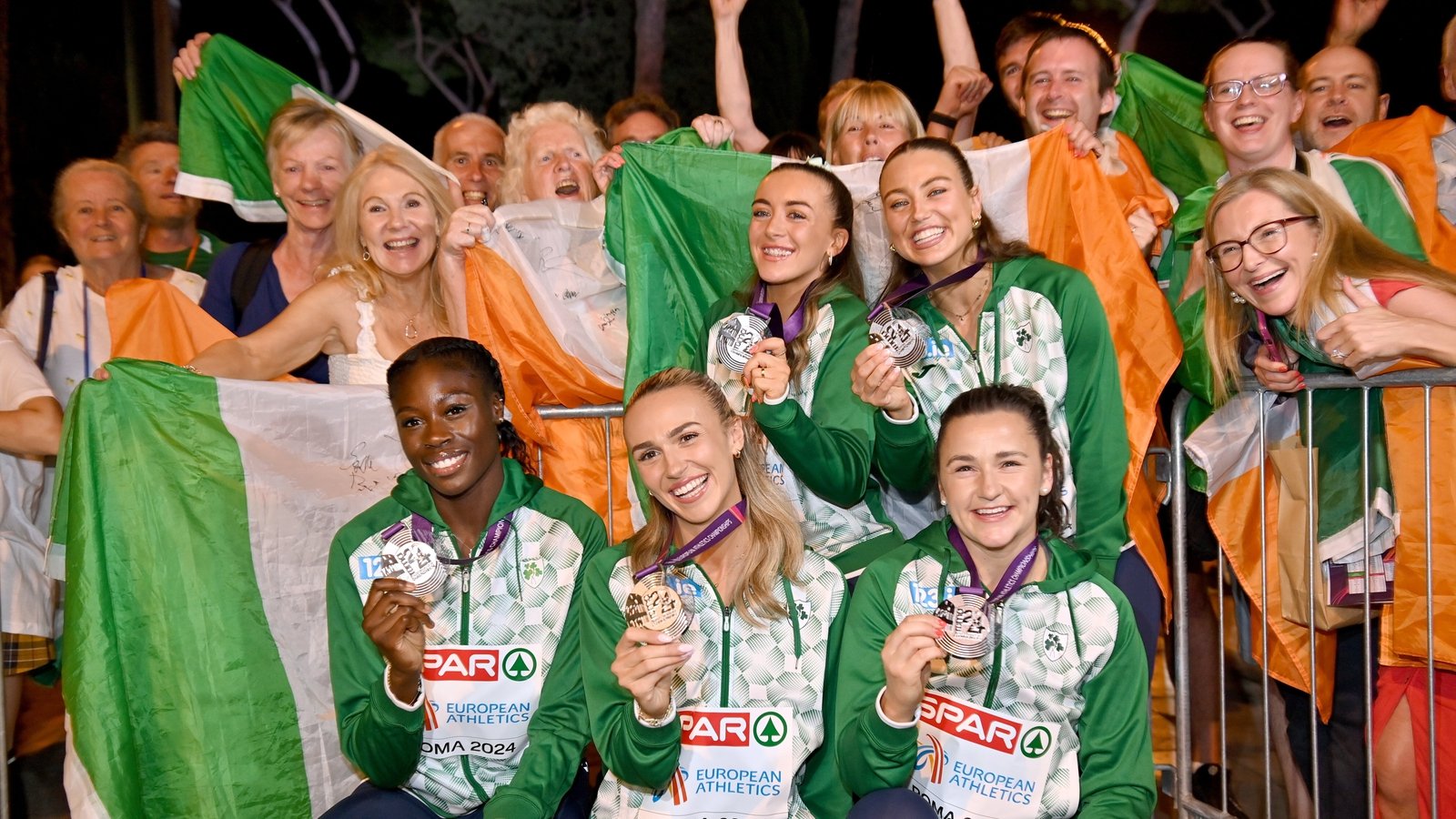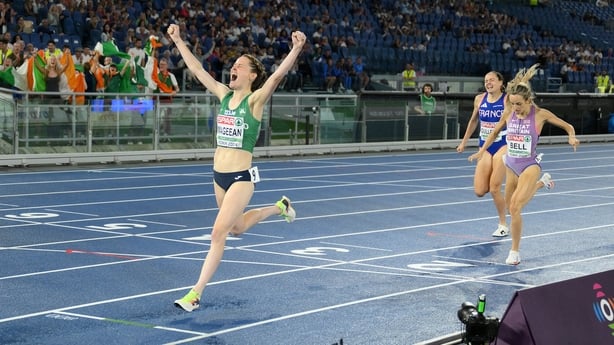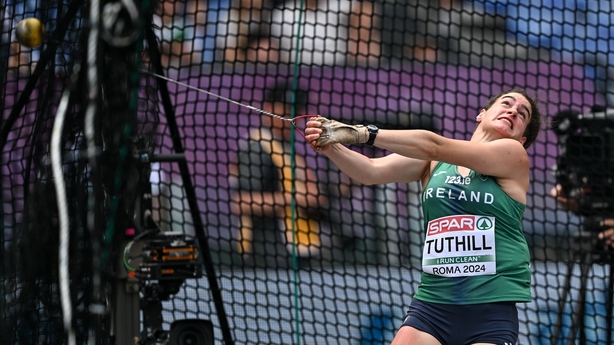Sports
Calm reflection required after eternal highs of Rome

Unprecedented success for the Irish team at the European Athletics Championships opens more doors to ongoing progression of athletes and fuels anticipation of Olympic success, but a pause for reflection is maybe now required.
Ireland sent a strong team capable of winning four medals in Rome and that’s the number they came home with – the bonus being the more-than-expected glittering composition of two golds and two silvers, which saw Ireland finish in the top 10 of the medal table ahead of such track and field powers as Germany, Ukraine and Sweden.
Those medals should be celebrated and the nation’s joyful response to the Irish storylines which emerged from Rome will energise the notion that Ireland can win a first track Olympic medal in almost a quarter of a century in Paris in just seven weeks’ time.
However, the true gauge for that kind of prospect cannot realistically or accurately be based on what was witnessed at the Stadio Olympico in the Italian capital.
Only in certain field events is European athletics a barometer for global success so a more authentic source were the World Championships in Budapest ten months ago and the World Relays held in the Bahamas in early May. From that well of performance, we can draw upon three top-four finishes with real prospect for improvement in all.
One thing which was clear in Rome was the progression in Rhasidat Adeleke by comparison to the athlete who was ranked fourth in the world over the women’s 400 metres in 2023.
Since then, she has left the compulsory grind of having to honour her scholarship duties representing the University of Texas, which effectively left her running on fumes in taking fourth place in the Hungarian capital at the World Championships.
Turning professional, as she did towards the end of last year, was always going to free up her coaching and training regime to prioritise just one event this year rather than divide herself between college obligations and the broader summer outdoor season.
The European Championships over the last week were never her main focus but were treated as a useful exercise on the road to Paris. Not only was there no significant tapering down for a four-race schedule in Rome, she did one of her most arduous training sessions just a day before stepping on the plane to Italy.
It’s a stretch to say that four hard runs in six days was a merely stiff workout – a kind of practice for the Olympic qualification schedule – but it was to her credit that she flew through that examination and picked off an Irish record in the process which afforded her a sample of the intensity that awaits in Paris.
Her appearance in Rome saw her run her first 400m outdoors out of blocks in 2024 with a safe qualification into the last eight and then in the final she blasted to that new Irish record of 49.07 seconds, which is approximately a metre of track quicker than her previous mark which was set in winning the NCAA Championship title almost exactly a year earlier.
It was evidence in just her second race of the outdoor season that she has literally kicked on to a new level and her time would have won Olympic gold in Rio (2016) and London (2012) by a clear margin of around two to three metres.
The question is, of course, how much more improvement is there over the next few weeks, so each race from now to Paris on the European circuit of meets will be closely monitored.
Adeleke will return to Ireland from her Texas training base for the National Championships in a fortnight (29/30 June) and then likely compete in Budapest on 9 July, Monaco on 12 July and London on 20 July.
In 2023, only three athletes were ahead of her in the world rankings at season’s end, one of them being the woman who edged her out in Rome for the gold medal, Natalia Kaczmarek of Poland, who was pushed on to a personal best time in the final by the proximity of Adeleke by her side all the way down the home straight.
Kazmarek, though, will not be the only obstacle she will have to overcome if she is to ascend the medal rostrum in Paris. World champion Marleidy Paulino of the Dominican Republic opened her 2024 season in ominous form clocking 49.30 seconds to win the 400 metres on a rainy cool night in Oslo on 30 May.
One possible barrier to a medal was removed over the last week when Olympic 400m hurdles champion Sydney McLaughlin-Levrone, the fastest in the world this year over 400m, declared her intention to run just the 400m hurdles in Paris.
Likewise, a similar decision should be made by world Indoor 400m record holder Femke Bol, who warmed up for the Olympics with a world leading time this year for the 400m hurdles of 52.49 seconds in claiming gold in Rome.

While Adeleke is embarking on her first Olympic quest, Ciara Mageean is heading to her third Games having had limited joy in Rio and Tokyo, failing to reach the 1500m final at either Olympics.
She is now, though, a more measured, mature athlete with vastly improved levels of conditioning and mental strength to deal with big occasions.
The difference has been striking and was evident in the summer of 2022 when in the space of a matter of weeks, she went from chasing Britain’s Olympic medallist Laura Muir hard across the line in the Commonwealth Games and European Championships – taking silver on each occasion – to then defeating the Scot for the first time in winning a Diamond League race in Brussels shortly afterwards.
There has been no let-up in Mageean’s late career progression since then with her fourth-placed finish at the World Championships last year in Budapest, representing the race of her life as she broke the Irish record, leaving nothing on the track crossing the line within touching distance of a medal.
Now 32 and with her progression showing no signs of waning, Mageean smashed her own Irish 800m record by a huge margin in Manchester last month before winning a Continental Tour Gold race in Ostrava and then onto Rome where she claimed her first ever gold medal at a major championship at any level.
No one knows more than the Portaferry woman that ascending the medal rostrum in Paris requires another step up in standard if she is to challenge the legendary Faith Kipyegon of Kenya along with the conveyor belt of Ethiopian talent.
But having seen the possibility of a global medal just in front of her in Budapest 10 months ago, she knows that in championship racing, as long as an athlete is in position coming off the final bend, dreams can be realised.
Ireland’s other hope for a Olympic medal will depend on the decision of Adeleke regarding taking part in the mixed relay which will be staged on the first two days of the track and field programme at the Olympics. The conversation with her coach Edrick Floreal as to whether she commits to running a leg in the final just two days before her main individual event is one laden with possible dilemma.
Several of her rivals, especially those from the USA along with Kaczmarek of Poland, are unlikely to take part in the mixed relay and will have ‘fresh legs’ for the three rounds of the womens 400m.
As brave and strong as the Irish mixed relay team will undoubtedly be without Adeleke, it would be a serious dent to their medal hopes minus her in the team
Even if Adeleke commits to the relay, it is likely that she will only run the final.
First though Ireland have to get into the final eight but if the improving Sophie Becker steps in for the semi and runs as well as she did with a huge personal best on the 11 May in Belfast (51.13 seconds), then the team can make the medal race without calling on Adeleke.

Any review of the Irish team performance at the European Championships has to include a look at the bright new talent that’s emerging right now and 20-year-old Nicola Tuthill, who was the second ranked Under-18 hammer thrower in the world in 2020, performed close to her best in both qualification and the final in Rome to wind up in a highly-promising 9th position,
Sean Doggett, the Irish Schools Championship winner from a fortnight ago, made his senior debut with the men’s 4x400m relay team on Tuesday last, becoming the youngest Irish male to run at major championship at 17 years and 219 days old.
Nick Griggs, still just 19, was a European Under-20 gold medallist at 16 in 2021 and has already competed in a World and Continental senior championship. While he had a disappointing run in Rome, he still has a chance to qualify for the Olympics over the next few weeks after picking up significant qualification points with his early season form.
And as we look for a middle distance successor to Ciara Mageean, there’s 23-year-old Sarah Healy (seventh in the Rome 1500m final) and European Under-23 Champion Sophie O’Sullivan coming through in the metric mile event.
The upcoming last few weeks of the Paris qualification window being open will tell us more about the form of Ireland’s Class of ’24 many of whom will be on show at the 123.ie National Championships at Morton Stadium Santry in a fortnight with live coverage on 30 June on RTÉ television.










